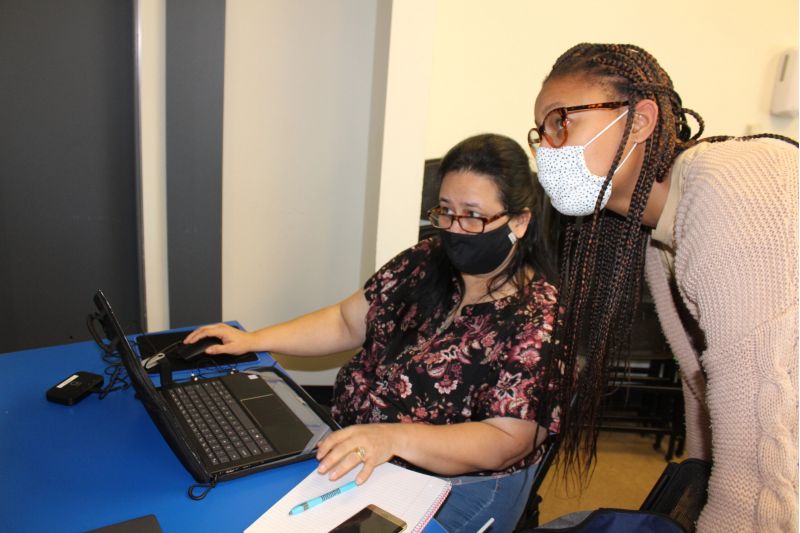Creating Job Opportunities in an Unpredictable Labor Market

The start of a new year brings countless predictions for what the next 12 months holds in terms of the economy, inflation, job growth and more. Although many experts disagree on what 2024 will bring, it’s likely that job gains will cool significantly this year.
Unfortunately, this trend may mean fewer job prospects for North Texans looking to find work, increase their salary or take the next step in their careers. And low income has a direct impact on the rest of a worker’s life. For example, when a person’s job opportunities are limited, they are less likely to achieve financial security, which can limit their children’s success in school and negatively impact their family’s health.
At United Way of Metropolitan Dallas, we have done significant research on the North Texas labor market to identify good jobs in growing industries. Armed with this deep understanding, we invest in comprehensive training programs to enable hard-working North Texans to earn short-term industry certifications that lead to good-paying employment in targeted sectors, including IT, healthcare and construction.
Supporting workforce development initiatives is a key part of our mission to improve access to education, income and health—because a living-wage job is fundamental for any individual or family to thrive.
Read on to learn more about job and wage growth predictions for the new year, how a lack of job opportunities impacts North Texans, and how United Way and our partners work together to improve access to living-wage jobs.
Fewer Job Opportunities in 2024
Most experts agree that the U.S. will add far fewer jobs in 2024 compared to last year, as consumer spending declines and the economy cools.
In 2023, payroll employment rose steadily, averaging 225,000 new positions nationwide per month. But for 2024, that monthly average could be anywhere from 53,000 to 100,000, depending on who you ask. Meanwhile, there is a chance the unemployment rate—currently at 3.7%—could rise as fewer companies hire new workers.
For North Texans who are looking for a job or hoping to make more money this year, these trends could limit their opportunities and have a very real impact on their day-to-day lives.
A Lack of Job Opportunities Hurts North Texans
When a community lacks job opportunities, it can be a struggle to find a living-wage job. In a tight job market, workers are more likely to live below the poverty line, many can’t afford stable housing, and their families’ health and educational prospects suffer.
In our state, hundreds of thousands of individuals are struggling because of limited access to good-paying jobs. The median household income in Texas between 2017 and 2021 was $67,321, and $74,580 nationwide in 2022. That means overall, Texans are making quite a bit less than their counterparts in other states. Workers of color, on average, tend to make even less than white workers.
As a result, our state has a relatively high poverty rate. According to the latest data from the Census Bureau, 14% of Texas’ population of roughly 30 million people are living in poverty. This is well above the national average of 11.6%, which totals 37.9 million Americans living below the poverty line.
Meanwhile, the cost of living has increased over the last few years as the price of housing, food and other necessities has risen. According to the Massachusetts Institute of Technology’s living wage calculator, a childless adult living in Dallas County needs to make $18.24 an hour to cover basic expenses and have a little money saved for emergencies. This number jumps to $35.74 if that person has a child. Just a few years ago, these hourly living wages were significantly lower—$15.98 for a childless adult and $31.94 for an adult with one child. Although inflation overall has started to fall, the cost of living in our community is still quite a bit higher than it was a few years ago, while wages have remained relatively level.
Each of these statistics tends to affect workers of color more acutely. Greg Mangum, vice president of economic mobility at United Way of Metropolitan Dallas, says workers of color in North Texas tend to have fewer pathways to good-paying jobs available. Plus, they’re more likely to have their careers impacted by external factors, such as access to childcare, transportation and digital literacy skills.
“Since the pandemic, everything has gotten more expensive, but unfortunately wages haven’t kept up with inflation or consumer price increases,” Mangum said. “And the workers in our community are up against enormous odds to find stable, good-paying jobs. That not only holds back individuals and their families; it holds back our entire community. It takes all of us working together to create and improve pathways to living wage jobs so every North Texan can prosper.”
United Way Creates Pathways to Better-Paying Jobs
Income is an area that affects our entire economy. When more North Texans prosper, our region as a whole enjoys greater prosperity.
At United Way of Metropolitan Dallas, income is one of our areas of focus, because we understand the positive impact of financial stability and a good-paying job on every part of a person’s life. We continually research the local labor market to identify strong job opportunities in growing industries. Working with our community partners and investors, we invest in and support comprehensive workforce training programs that enable individuals to quickly earn industry certifications that open pathways to steady employment in fields such as healthcare, IT, transportation and logistics, and construction.
One of our Aspire United 2030 goals—our North Star for driving progress in the areas of education, income and health over the next decade—is to increase by 20% the number of young adults who earn a living wage. Reaching that milestone will add nearly $800 million to our local economy.
To advance that goal, our workforce development initiatives include:
- Pathways to Work: A partnership with 36 community organizations that provides fast-track industry certifications that lead to good jobs in growing industries, such as IT, construction and healthcare. Through United Way’s investment in Pathways to Work and related Community Impact Grants, in the last year more than 20,000 North Texans had access to job skills training and resources and nearly 3,000 were placed in new and better jobs.
- Dallas Technology Training Consortium: Funded through a grant from the City of Dallas, the consortium provides IT and technology skills training to individuals impacted by the COVID-19 recession. The program serves 630 Dallas residents over a two-year period, in partnership with Goodwill Industries of Dallas, NPower and Per Scholas.
- CSW Workforce Benchmarking Network: United Way is part of the Workforce Benchmarking Network (WBN), which brings together community-based organizations, public and private funders, and other intermediaries that provide workforce development services around the country to support better results for job seekers, employers and communities. Led by CSW (Corporation for a Skilled Workforce), the network improves the availability of quality data and information about the labor market, programs and practices. It also builds the capacity of local service providers to use that evidence to develop more effective services and policies.
- Career navigation: United Way recently supported a career navigator position with our community impact partner WiNGS. As a key member of the organization’s Financial Empowerment Centers, the navigator will provide guidance to local workers seeking to explore, participate in and complete job skills training programs that lead to sustainable employment with a living wage and benefits. They will also coordinate referrals to supportive services and community assistance programs to ensure participants have the support necessary to complete their education.
Join Us in Supporting a Stronger Workforce
A strong workforce benefits all of North Texas by strengthening our economy, improving educational outcomes, lowering healthcare costs and more.
We invite you to join our movement and create opportunity for all North Texans. You can have a direct impact on workforce development in our region by:
- Making a donation to United Way, which will support workforce development initiatives like the ones outlined above.
- Volunteering for one of our workforce development initiatives. Throughout the year, United Way and our partners hold volunteer opportunities that strengthen our workforce. Right now, you can volunteer to introduce local students to a variety of career opportunities. Visit our January volunteer page to get started.
- Advocating with us. This is an important year for public policy changes, with a presidential election and several significant local ballot measures. Sign up for our Advocacy Alerts to learn how and when to advocate with us and other change-seekers across North Texas.
Tags

Improve Access to Financial Stability
An investment in United Way expands career opportunities for North Texas, bringing greater financial stability to more of our neighbors.


